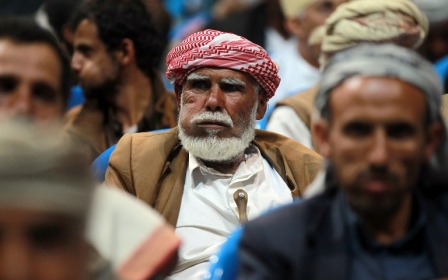Mortar rounds hit military airport in Sana'a, as US deny pressuring Saleh to leave

Brief clashes broke out at a military airport in the Yemeni capital Sana’a Wednesday, in a day of violence and controversy that saw two top al-Qaeda commanders killed in a drone strike and the US deny putting pressure on ex-president Ali Abdullah Saleh to leave the country or face sanctions.
Three mortar rounds struck the runway of a military airport in Sana’a on Wednesday evening, which is used as a base by the Yemeni army. The attack took place near to the civilian international airport.
Locals reported on Twitter that the military airport is still functional and described attackers as arriving on motorbikes before fleeing the scene.
Media associated with the Houthi rebels reportedly said calm had been restored at the airport.
The airport attacks came after US officials were forced to deny they had told former president Ali Abdullah Saleh to leave the country by 5pm (1400GMT) on Friday.
Saleh’s party, the General People’s Congress (GPC), said they had been approached through an intermediary who made the ultimatum, which they denounced as meddling in Yemeni affairs.
"This is blatant interference in the internal affairs of Yemen," a spokesman for the party was quoted as saying in a statement.
"It is an unacceptable demand because no foreign party has the right to request that a Yemeni leaves their country."
The GNC called on Saleh's supporters to mobilise in order to "face any eventuality."
Saleh responded to the reports on Facebook by saying: “The mother of the person who will make me leave Yemen has not yet been born.”
US State Department spokesperson Jen Psaki, however, denied the reports and said: “there have been no meetings between the ambassador and GPC officials at which any such statements have been made.”
Saleh served as Yemen’s first president after unification in 1990 before being forced to stand down in early 2012, after a year of popular protests against his rule.
The GPC statement on Wednesday came just hours after diplomats in New York said the UN Security Council was poised to impose sanctions on Saleh for obstructing peace in Yemen.
A US-drafted proposal to the Security Council could slap a visa ban and an assets freeze on Saleh and two of his perceived allies, Shiite Houthi rebel commanders, Abd al-Khaliq al-Houthi and Abdullah Yahya al-Hakim.
The 15 UN Security Council members have until Friday evening to raise objections before the proposal returns to the sanctions committee for action.
Some Yemenis have said they were pleased at the prospect of Saleh facing justice, while others fear the sanctions may prevent the country moving forward.
"Sanctions should have been imposed on Saleh after he stepped down. Now I fear the sanctions will only destabilise things more," Ahmed al-Malsi, an accounting student at Sana’a University told MEE on Monday.
Malsi pointed out that many other figures in Yemen are implicated in allegations of corruption and stand accused of disrupting the transition.
"It is right to point the finger at these five, but there are hundreds more who have stolen and sabotaged the transition, they should be punished too," he said.
Saleh is seen as a key backer of the rebel Houthi movement that seized the capital Sana’a in September, and has since spread its control into central and west Yemen, in defiance of a UN peace plan.
Saleh’s son, Ahmed Ali, dismissed as head of the Republican Guard by current president Abd Rabbuh Mansur Hadi, is Yemen’s ambassador to the UAE who Yemeni officials have also accused of backing the Houthis in an effort to weaken local Muslim Brotherhood party, al-Islah.
Elsewhere on Wednesday, two senior al-Qaeda officials - Shawki al-Badani and Nabil al-Dahab - were killed in a drone strike, according to Yemeni tribal sources who spoke to AFP.
Later in Sana’a, Houthi rebels killed an Algerian man and wounded a French national, after an argument at a checkpoint in the capital.
The two men were stopped on suspicion of carrying explosives, leading to a dispute, where the Algerian stabbed one of the Houthis before he was shot dead himself, security sources told AFP.
The security source said the body of the Algerian was taken to a public hospital, while the wounded Frenchman was brought by the rebels to a clinic under their control.
The students were later confirmed as Salafi students studying in the city.
Residents in the capital of Sana’a separately told MEE of their anger at the Houthis for enforcing law and order in the city, which they said had undermined the government.
Stay informed with MEE's newsletters
Sign up to get the latest alerts, insights and analysis, starting with Turkey Unpacked
Middle East Eye delivers independent and unrivalled coverage and analysis of the Middle East, North Africa and beyond. To learn more about republishing this content and the associated fees, please fill out this form. More about MEE can be found here.




